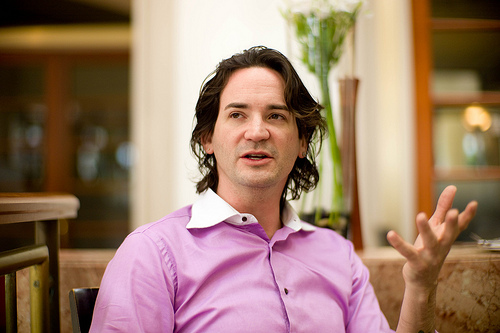Build first, plan later: ex-Google CIO

Companies should drop 1990s-style thinking and build products first, then figure out what to do with them to be able to reach customers on a human level, according to former Google chief information officer now-CEO of ZestCash Dr Douglas Merrill.
At the CA World Expo held in Sydney today, Merrill said that internet users have moved away from the clean, formal presentation of information, such as that found in traditional newspapers, in favour of crowd-sourced information where each user can tell their story. Although users have found the shift valuable, businesses need to change the way they operate.
"Building innovative solutions, particularly in this era of now when things change so rapidly, is not about having perfect, great project management. The more project management you do, the less likely your project is to succeed," he said.
"It's not about knowing exactly how much hardware you need and exactly how much capex you need. The more time you spend on that, the less time you spend building your products. Build your products and then figure out what to do with them."
Merrill pointed towards the US Fortune 100 listing of companies last year, compared with 1990, and noted the huge difference between the two.
"If you look at the Fortune 100 last year, two out of every three companies that was on in Fortune 100 in 1990 is no longer on it. That's a fairly disturbing statistic," he said.
Merrill added that as technology has changed, so have the methods of consumption, which requires companies to take a different look at how they use IT. However, he said that companies are still using technology in the wrong way, looking at the data that can be used with it rather than the connections it makes between users. He used Google's Product Search and Amazon's "what your people similar to you bought" feature as an example.
"We [Google] believed what mattered was showing you data. Amazon believed what mattered was telling you what other people like you did. Amazon's product? Hugely successful. Product Search, our product? It's no longer offered," he said.
While Google's plan at the time was to provide users with enough data about a product in order for them to make an informed purchasing decision, Merrill said it ultimately failed because it wasn't what users actually wanted.
"That is the classic technology answer — it doesn't matter what actually the customer wants, we're going to build that."
Merrill didn't advocate asking users what they wanted either, saying that focus groups produce responses the way a focus group member thinks a company wants them to.
"You cannot ask your customer what they want because they do not know," he said. "What you have to do is look at what your customers do. You cannot ask them, but you can listen to them."
Merrill pointed to the example of Google's auto-suggest feature in its search engine, which examines the results of everyone's search requests and uses the information to suggest when terms are misspelt based on when people find what they're looking for.
"We let our users teach us spell correct. We couldn't have asked the customer, 'Hey, do you want want spell correct?' because they would have said no. Simply by watching what our users did, we invented what is by far, our most popular feature: spell correction."
Merrill also said that businesses shouldn't be afraid to do dumb things, telling the story of how Google's first machines were built on hardware sourced from the trash and how budget, low-end parts were used in its machines in the early 1990s.
"[Google founders] Larry [Page] and Sergey [Brin] built Google on the inherent notion that no particular piece of hardware was reliable because the stuff broke all the time."
Merrill talked about how the hard drives were bought from local shops and the RAM used in its machines were aftermarket returns that had previously failed memory tests. However, despite this, Google saw a huge cost saving in having always built for unreliability.
"Each one of those machines is about 1/10,000th the cost per MIP of a high availability system like an HP Palladium. Don't be afraid to be dumb because it can change the game. Everyone knew we shouldn't build on dud hardware. Everyone was wrong."
Another area Merrill thought businesses failed at was the hiring of diverse workers. He said when teams have people who are diverse and don't necessarily agree with you, businesses are able to create plans that are much more resilient to change.
"Diverse teams are annoying because you've heard people who aren't like you, which means they argue with you and sometimes you want them to shut up and do what you tell them," he said. "Hire someone that annoys you because if they annoy you, they're far more likely to be diverse — diverse means better answers."
Merrill said that the prospect of hiring annoying people might sound counter-intuitive, but was important.
"If you hire these really interesting, diverse people, and you give them the room to talk, it will be annoying, but it gives you the opportunity to win."
